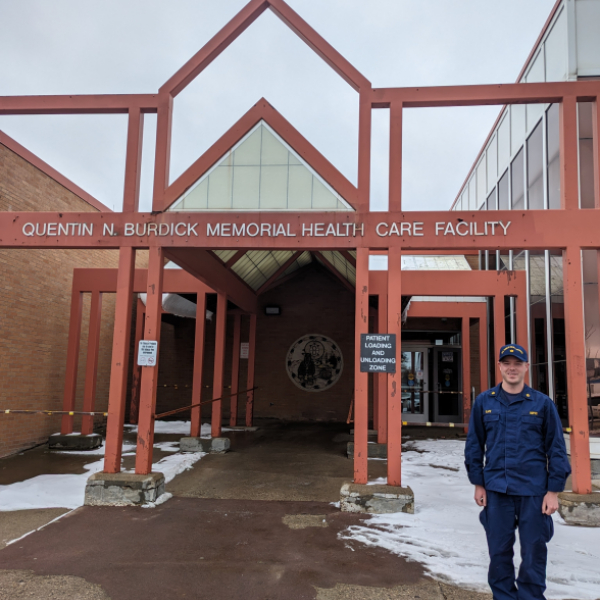Andrew Glatz, PharmD ‘18, BCACP, still relies on his clinical training from his time studying at the College of Pharmacy.

A pharmacy career dedicated to serving Indigenous people communities.
Before his student days at the University of Michigan College of Pharmacy, Andrew Glatz, PharmD ’18, BCACP, had never heard of the Indian Health Service (IHS).
What he found in his residency with the IHS at Turtle Mountain Reservation was a welcoming community and the opportunity to practice at the top of his license — serving as a pharmacist to the Native American community in varied settings, launching programs to meet their needs, and training the pharmacists of the future.
It all started in Ann Arbor.
A good friend in college in Ann Arbor introduced Glatz to the culture of Michigan’s indigenous tribes. Then, early in his PharmD program, a P4 student shared her experiences on a rotation working in the Native community in St. Ignace, Michigan. “She was able to do so many interesting things clinically in that setting. With her appreciation for the patient population, the role brought her great satisfaction in interacting with patients daily. That’s what got me first started thinking about the IHS as a career path,” Glatz recalls.
That interest led him to pursue an externship with the US Public Health Service (USPHS). Members of the Commissioned Corps of the USPHS work on the front lines of public health, responding to health emergencies, fighting disease, and caring for patients in underserved communities across the nation and throughout the world. A positive experience at his externship in Baltimore was one of the reasons he sought a commission in USPHS after graduation.
Once commissioned with the USPHS as a pharmacist, he became the first PGY1 assigned to a residency at the Turtle Mountain IHS site in Belcourt, ND, about five miles south of the Canadian border. He stayed on at the IHS after his residency, thriving as he progressed into different roles. After five years, he is a Lieutenant Commander in the Public Health Service and a Clinical Pharmacist for about 16,000 members of the Turtle Mountain Band of the Chippewa Tribe living on and around the reservation.
That is a goal Glatz has taken very much to heart. In his day-to-day duties, he rotates between ambulatory, emergency, and in-patient settings, providing pharmacy services. He works collaboratively with a team of about 17 pharmacists and seven pharmacy techs. Another part of his role is coordinating pharmacy services for patients who need specialized care not available at the facility, including dialysis provided at an independent clinic next door to the hospital.
Establishing a pain management program is something I am most proud of.
When he was a resident, he played a key role in establishing a pain management program in collaboration with the hospital’s physical therapy department using dry needling, a technique like acupuncture. “I was able to work collaboratively as a team to establish more non-pharmacological methods to deal with chronic pain,” he says. “A lot of our patients who are living with pain derive real benefit from that program.”
He now chairs the hospital’s controlled substance stewardship committee, which is focused on ensuring patients living with chronic pain and/or taking controlled substances for any reason receive evidence-based pharmacological and nonpharmacological treatment. He also serves on various other regional and national committees, mostly on the topic of pain management.
When he’s not seeing patients, he assists with the pharmacy’s informatics services, which include electronic health records maintenance, an outpatient dispensing system, and a drug infusion pump library.
A commitment to making sure his students and residents leave this rotation knowing they are capable to practice.
Glatz enjoys precepting pharmacy students from across the nation. Last year, he also became director of the PGY1 residency program, giving back to the program that launched his career. This role is providing some of his most rewarding career moments. “I love seeing students and residents grow in their skills and confidence. I offer a really rigorous and fairly independent rotation. We work with learners to get them to the point where they are capable of seeing patients in consultation rooms on their own, and, they leave this rotation knowing they are capable of practicing.”
A reliance on his training from the College of Pharmacy daily.
Glatz says his training at the College of Pharmacy gave him that confidence in his capabilities. “Michigan has a really rigorous clinical training program that I rely on daily.,” he notes. Another benefit of his education he never expected to appreciate is his well-honed ability to review literature efficiently to guide his recommendations. “Every day, I get new clinical questions that arise, and being able to efficiently collect and interpret existing literature to formulate a customized care regimen is something I rely on every day. The tools I gained at Michigan allowed me to do that well.”
Within the Belcourt community, he enjoys the opportunity to establish that continuity of care. In fact, on day one of his residency, he told a woman she was his very first patient. Nearly six years later, “every time she sees me, she reminds me of that, saying, ‘I was your very first patient, and I’m so glad you’re still here.’”
That is the College of Pharmacy difference at the University of Michigan.



